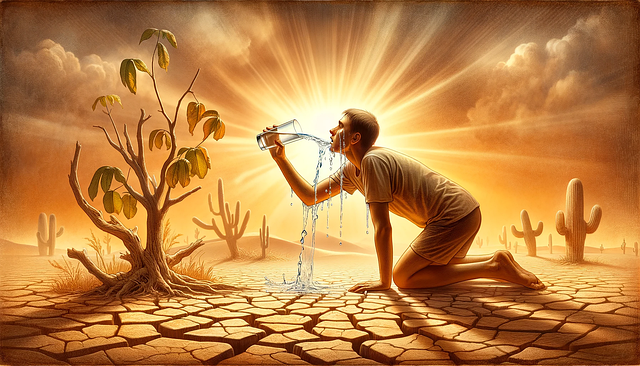
Water is the elixir of life, an essential component that sustains our bodies and supports numerous bodily functions. Yet, in the hustle and bustle of daily life, it’s easy to overlook the importance of staying adequately hydrated. Dehydration occurs when the body loses more fluids than it takes in, and the consequences can range from mild discomfort to severe health issues. In this blog, we will delve into the various symptoms of dehydration, shedding light on the importance of recognizing and addressing them promptly.

- Thirst: The Body’s Cry for Hydration
Thirst is the most straightforward and perhaps the most commonly known symptom of dehydration. When the body’s fluid levels drop, a signal is sent to the brain, triggering the sensation of thirst. While it may seem obvious, many people still ignore this basic cue. Ignoring thirst can lead to a cascade of other symptoms and complications, emphasizing the critical role of responding promptly to your body’s need for water.

- Dark Yellow Urine: A Window to Hydration Status
Your hydration status can be checked simply by monitoring urine color. Dark yellow or amber-colored urine is a sign that your body is lacking adequate fluids. Ideally, proper hydration is indicated by light yellow or straw-colored urine. Discoloration in urine can be an early warning sign of dehydration and should not be ignored.

- Dry Mouth and Dry Skin: External Manifestations of Internal Imbalance
Dehydration can manifest externally through dry mouth and dry skin. When the body lacks sufficient water, it redirects fluid away from less critical functions, leading to reduced saliva production and dryness in the mouth. Additionally, dehydration can affect the skin, causing it to lose elasticity and become dry, flaky, or even cracked. Valuable clues about your hydration levels could be provided by monitoring the changes in oral and skin health.
- Fatigue and Lethargy: Energy Drainage
Feeling unusually tired or lethargic may be an indication of dehydration. Water is vital for the transportation of nutrients and oxygen throughout the body. When dehydration sets in, the cardiovascular system has to work harder to maintain blood flow, leading to increased fatigue. If you find yourself dragging through the day despite adequate sleep, it’s worth considering whether dehydration might be a contributing factor.

- Headaches: The Brain’s Call for Hydration
Headaches and migraines could be triggered by dehydration. The brain is highly sensitive to changes in fluid balance, and even mild dehydration can lead to a decrease in cerebral blood flow. This, in turn, can result in headaches. If you’re experiencing persistent headaches, it’s crucial to evaluate your water intake and make necessary adjustments.
- Dizziness and Lightheadedness: The Perils of Dehydration on Blood Pressure
Dehydration can have a significant impact on blood pressure. When the body loses fluids, the volume of blood decreases, leading to lower blood pressure. This can cause dizziness and lightheadedness, especially when standing up quickly. Individuals who experience frequent bouts of dizziness should consider dehydration as a potential factor and increase their water intake.
- Muscle Cramps: An SOS Signal from Your Muscles
Muscles require an adequate balance of fluids and electrolytes to function properly. Dehydration disrupts this balance, making muscles more prone to cramps and spasms. If you find yourself experiencing muscle cramps, especially during physical activity, dehydration could be a contributing factor.
Conclusion:
Dehydration is a common and often underestimated health issue that can affect anyone, regardless of age or fitness level. Recognizing the symptoms early on is crucial for preventing complications and maintaining overall well-being. Thirst, changes in urine color, dry mouth, fatigue, headaches, dizziness, lightheadedness, and muscle cramps are all signals that your body needs more fluids. By listening to these cues and prioritizing hydration, you can support your body’s optimal functioning and enjoy the numerous benefits of staying adequately hydrated. Remember, water is not just a beverage; it’s a fundamental building block of a healthy and vibrant life.







